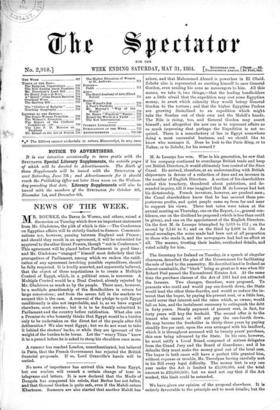The Secretary for Ireland on Tuesday, in a speech of
singular clearness, described the plan of the Government for facilitating the sale of land to the peasantry. He described land in Ireland as almost unsaleable, the " block " being as great as it was when Sir Robert Peel passed the Encumbered Estates Act. At the same time the purchase clauses of the Act of 1881 had not attracted the farmers. Two changes, therefore, were proposed. To peasants who could and would pay one-fourth down, the State would lend the other three-fourths, and would so reduce the in- terest that the buyer, by paying his present rent, or a little less, would cover that interest and the rates which, as owner, would fall on him, and the instalment necessary to extinguish the debt in forty years. Steady payment of present rent, in fact, for forty years will buy the freehold. The second offer is to the tenant who cannot or will not pay the one-fourth down. He may become the freeholder in thirty-three years by paying steadily five per cent. upon the sum arranged with his landlord, which it is throughout assumed will be twenty years' purchase, this sum being advanced by the State. In his case, however, he must satify a Local Board, composed of sixteen delegates from the Grand Jury and the Board of Guardians ; and if he defaults they must make the money good out of the local cern. The buyer in both cases will have a perfect title granted him, without expense or trouble, Mr. Trevelyan having carefully met in his Bill every legal difficulty. The money lent in any one year under the Act is limited to 25,000,000, and the total amount to £20,000,000; but we need not say that if the Act worked, this limit could be extended.


































